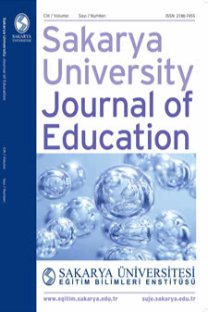Middle School Students’ Devotion to Democratic Values
Ortaokul Öğrencilerinin Demokratik Değerlere Bağlılık Düzeyleri
___
- Abrahams, M.&Smith, J. (2011). A Study of Perceptions around Democracy in Six Communities in the Umgungundlovu District Municipality, KwaZulu-Natal. PACSA: 2010 Democracy Perception Barometer.
- Aggarwal, J.C. (2005). Teaching and Education in a Developing Society (4th Edition). New Delhi: Viking Publishing House
- Akın, U.&Özdemir, M. (2009). An examination of teacher candidates’ democratic vaşues in terms of various variables: The case of faculty of educational sciences. Journal of Faculty of Educational Sciences, 42( 2), 183-198.
- Cohen, J., Pickeral, T.&Levine, P. (2010). The foundation for democracy: Promoting social, emotional, ethical, cognitive skills and dispositions in K-12 schools. Interamerican Journal of Education for Democracy, 3(1), 74-94.
- Çetinkaya, Ç.&Kincal, R.Y. (2015). Democracy education of gifted and talented children. Journal of Gifted Education Research, 2015, 3(1), 1-22.
- Daher, W. (2012). Student teachers’ perceptions of democracy in the mathematics classroom: Freedom, equality and dialogue. Pythagoras, 33(2), Art. #158.
- Demir, S.&Bedir, G. (2013). An assessment of instructional practices in terms of democratic participation, freedom and autonomy. Journal of Educational and Instructional Studies in the World, 3(1), 32-43.
- Doğanay, A.&Sarı, M. (2004). Elementary school students’ devotion level to democratic values and comparison of the effect of overt and hidden curriculum on gaining democratic values in terms of students’ and teachers opinions. Kuram ve Uygulamada Eğitim Yönetimi. 39, 356-383.
- Güven, A. (2007). Studying democratic attitude of the students in history education in terms of individual variables. Kazım Karabekir Eğitim Fakültesi Dergisi, 15, 36-61.
- Hahn, C.L. (2003). Democratic values and citizen action: A view from U.S. 9th graders. International Journal of Educational Research, 39, 633-642.
- İlgan, A., Karayiğit, D.&Çetin, B. (2013). Examining democratic values of middle school students in terms of some variables. CBÜ Sosyal Bilimler Dergisi, 11(2), 97-118.
- Kepenekçi, Y. (2003). Demokratik okul *Democratic school+. Eğitim Araştırmaları Dergisi *Eurasian Journal of Educational Research], 11, 44-53.
- Kincal, R., & Isik, H. (2003) Demokratik eğitim ve demokratik değerler *Democratic education and democratic values+. Eğitim Araştırmaları Dergisi *Eurasian Journal of Educational Research+. 11, 54- 58.
- Sarı, M. (2007). Demokratik değerlerin kazanımı sürecinde örtük program: Düşük ve yüksek ‚okul yaşam kalitesi‛ne sahip iki ilköğretim okulunda nitel bir çalışma. Unpublished PhD. Dissertation. Adana: Çukurova Üniversitesi Sosyal Bilimler Enstitüsü.
- Sarı, M., Sarı, S.&Ötünç, M.S. (2008). An investigation of devotion to democratic values abd conflict resolution abilities: A case of elementary school students. Kuram ve Uygulamada Eğitim Bilimleri, 8(1), 183-192.
- Slev, A.M. (2014). Perceptions of democracy and democratic principles among Romanian law students. Social-Behavioral Sciences, 1(73), 38-44.
- Subba, D. (2014). Democratic values and democratic approach in teaching: a perspective. American Journal of Educational Research, 2, No. 12A, 37-40.
- Şaylan, G. (1998). Demokrasi ve Demokrasi Düşüncesinin Gelişmesi *Democracy and the development of democratic thinking+. Ankara: TODAİE Masaüstü Yayıncılık.
- Topkaya, E.&Yavuz, A. (2011). Democratic Values and Teacher Self-Efficacy Perceptions: A Case of PreService English Language Teachers in Turkey. Australian Journal of Teacher Education, 36(8), 31- 48.
- Ulusoy, K. (2007). Lise Tarih Programlarında Yer Alan Geleneksel ve Demokratik Değerlere Yönelik Öğrenci Tutumlarının ve Görüşlerinin Çeşitli Değişkenler Açısından Değerlendirilmesi, Unpublished PhD. Dissertation, Gazi Üniversitesi Eğitim Bilimleri Enstitüsü, Ankara.
- Ural, A. (2013). An evaluation of the perception of democracy among university students through the use of metaphors. International Journal of Education and Research, 1(8), 1-14.
- Yüksel, İ., Bağcı, Ş.&Vatansever, E. (2013). Evaluation of affective learning outputs of primary school senior students: Democratic values. Adıyaman Üniversitesi Sosyal Bilimler Enstitüsü Dergisi, 6(12), 309-334.
- ISSN: 2146-7455
- Yayın Aralığı: 3
- Başlangıç: 2011
- Yayıncı: Sakarya Üniversitesi Eğitim Bilimleri Enstitüsü
Yabancı Dil Ögretiminde Üretim Amaçlı Oyunlar Bağlamında ‘Edebi’ Ve ‘Soruna Dayalı’ Rol Oyunlar
Book Review on "ETpedia: 1,000 ideas for English language teachers"
Lise Öğrencilerinin Sosyal Ağ Siteleri Kullanımının Yordayıcısı Olarak Çok Boyutlu Yalnızlık
Çözüm Odaklı Kısa Süreli Grupla Psikolojik Danışmanın Lise Öğrencilerinin Akran Zorbalığına Etkisi
Çözüm Odaklı Kısa Süreli Grupla Psikolojik Danışmanın
Eğitim Fakültesi Öğrencilerinin Duygusal Zeka ve Yaşam Doyumlarının İncelenmesi
Meryem ÖZDEMİR, Mücahit DİLEKMEN
Lise Öğrencilerinin Sosyal Ağ Sitleri Kullanımının Yordayıcısı Olarak Yalnızlık
